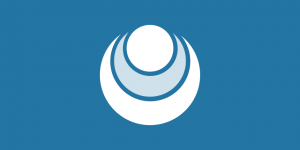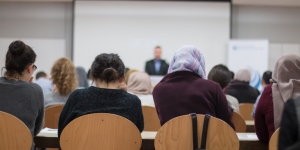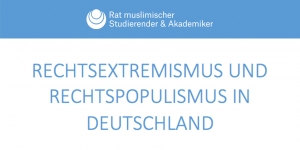Sie sind hier
Report on the 1. International Summer School at the Professor Dr. Fuat Sezgin Research Foundation for the History of Sciences in Islam
More than 20 students from several countries (Turkey, Iran, Austria, Netherlands and Germany) and from different academic disciplines participated at the 1.International Summer School, which took place from July, 29th . August, 2nd 2012 at the Professor Dr. Fuat Sezgin Research Foundation for the History of Sciences in Islam (conference hall) and at the Museum for the History of Science and Technology in Islam (Rose Garden, Istanbul).
The summer school was officially inaugurated on Monday morning, July 30th by the chairman of the governing board of the foundation Ahmet Bilgen (Istanbul, Turkey) who introduced the life and work of Professor Sezgin and the history of the museum and a key note by Professor Jan Hogendjik (Uetrecht University,Netherlands) focussing on the scientific methodology of Professor Dr. Fuat Sezgin. During the morning session Dr. Detlev Quintern (Professor Dr. Fuat Sezgin Research Foundation for the History of Science in Islam, Istanbul and Institute for Ethnology and Cultural Studies, University of Bremen, Germany) gave a first insight to potential epistemological approaches to the history of science and the actuality of Arabic-Islamic sciences regarding their interdisciplinarity, sustainability and justice before contradicting the myth of the renaissance in the Eurocentric historiography.
The accompanying programme (Ebru painting presented by Coskun Uzunkaya) during the lunch break took place at the Caferaga-Medresesi, built by the famous Ottoman architect Sinan in 1559. The afternoon session focussed on the concepts of knowledge in Islam and the rise of a new Enlightenment (Dr. Detlev Quintern). A film, which documents the creativity and the body of works of Professor Dr. Fuat Sezgin related to the establishment of the Institute for the Arabic-Islamic Science and Technology in Frankfurt, J.W. Goethe University, Germany in 1980 and the Museum for the History of Science and Technology in 2008 in Islam in Istanbul, was shown at the museum.s cinema. The first day of the summer school concluded with a visit of the old book market at the Grand Bazar and a modern book fair near the Istanbul University.
On Tuesday, 31st, after a short introduction (Dr. Detlev Quintern), the participants explored the Museum. During the lunch break the Süleymanie mosque and the library (exhibition of old Islamic manuscripts e.g. Qanun fi-t-tibb by Ibn Sina) were visited. During the afternoon session Dr. Detlev Quintern gave a lecture .On pharmacy as long-term history. while underlining the potentials of Istanbul.s Museum for the History of Science and Technology in Islam.
At sunset (oruç) Ahmed Bilgen (chairman of the governing board of the Foundation) invited all participants to a shared iftar to a beautiful restaurant on the shores of the Bosporus.
Shared Iftar
On Wednesday, August 1st Professor Dr. Jan Hogendijk, Wilfred de Graaf and Henk Hietbrink (University of Utrecht, Netherlands) instructed an astrolabe workshop in which the participants learned to use a model of an astrolabe in several functions (e.g. determining the length of a specific day). Afterwards the students researched the astrolabes in the museum by describing a specific instrument of their choice.
Along this example they formulated questions and discussed these with the
workshop team. During the afternoon session Professor Dr. Jan Hogendijk
presented on how to design workshops in general while reflecting his experiences on the popularization of Islamic sciences.
Astrolabe workshop
Professor Elaheh Kheirandish, Ph.D. (Harvard University, Cambridge, USA) gave an insight in the collaborative work with her students creating an exhibition at the Houghton Library and showed a film on the travel and cross-cultural interlacing of knowledge and science in the context of the flourishing of Islamic sciences during medieval Islam. Later on in the afternoon Dr Bagheri of the Institute of the History of Islamic Sciences (Tehran, Iran) presented a documentary film on the construction and production of an astrolabe.
On Thursday, August 2nd Professor Dr. Ingrid Hehmeyer (Ryerson University,
Toronto, Canada and Göttingen University, Germany) presented during the morning session water lifting devices, followed by a hands-on session using the models and instruments in the museum. During the afternoon session Professor Hehmeyer held a lecture on medical sciences with special regards to the Islamic contributions. She then gave a guided tour of the museum.s section on medicine and pharmacy. Professor Hehmeyer elucidating the didactic potentials of the museum.s models
Finally two future projects of the Professor Dr. Fuat Sezgin Research Foundation in cooperation with several universities were shortly introduced:
- The Ibn Sina medical garden project (with the participation of Professor Dr.
Talat Çifti, Bahceshehir University, Istanbul, Ass. Professor Dr. Murat Cekin,
Marmara University and Silvia Erdem, Artist, Istanbul)
- The Piri Re.is World Map in its historical context: From the Ma.amoun
Geographers to Ottoman Sea Cartography
Results and Outlook
The first International Summer School at the Professor Dr. Fuat Sezgin Research Foundation for the History of Sciences in Islam brought together scholars, young researchers and students from various fields of the history of sciences with a special focus on Islamic contributions (and further disciplines like architecture, political sciences and theology), while promoting an Eastern-Western cross-cultural dialogue. Istanbul.s Museum for the History of Science and Technology along with the foundation.s conference hall and other facilities were an ideal learning space, especially in the context of combining theoretical deduction and practical exploration of the instruments and models in the museum. The combination of teaching units with practical oriented workshops in which the participants learned to experience the multifunction of the scientific instruments (e.g. astrolabes), not only proved popular but made possible a deeper understanding with regard to the
complexity of the instruments, devices and models. Future summer schools might allocate more time for each section and research field, in order to give the participants more space for self-exploring and reflection. The participants agreed to create a communicative network and to continue cooperation.
Dr Detlev Quintern
s.auch : http://hsozkult.geschichte.hu-berlin.de/termine/id=19295
http://detlevquintern.wordpress.com/projects/






